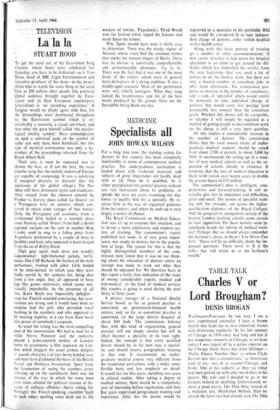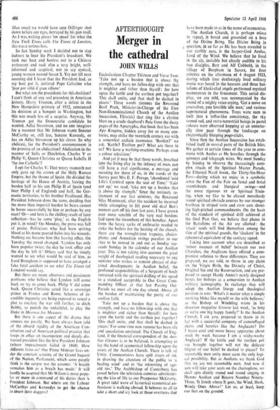Charles V or Lord Brougham?
TABLE TALK DENIS BROGAN
Washington-Princeton—In one way, I am e- very experienced journalist. I have a brown thumb that leads me to miss important stories with distressing regularity. In the hot summer of Chicago in 1934 (they had long and hot if less dangerous summers in Chicago, as we have today) I was tipped off by a police reporter on the Chicago Daily News that John Dillinger- 'Public Enemy Number One,' to whom Clyde Barrow was 'not a circumstance,' as Americans used to say—was in or around Chicago, and broke. One of his 'cohorts' as they say today had been picked up with only two dollars in his pocket. My wife and I decided to go to the pictures instead of sleuthing. Unfortunately we chose a good movie, The Thin Man, instead of a mediocre one, Manhattan Melody. Had We chosen the latter (we had already seen The Mt Man once) we would have seen Danger shot down before our eyes, betrayed by his gun moll. As I wasswriting pieces 'on space' for what the New York Times calls The Times of London, this was a serious loss.
So last Sunday week I decided not to stay indoors to hear the President's broadcast. We took our host and hostess out to a Chinese restaurant and took also a very bright, well- informed and sceptical, not to say cynical, young woman named Susan S. Yet not till next morning did I learn that the President had, as my host put it, imitated Pope Celestine who 'fece per vilta it gran rifiuto.'
But what are the precedents for this decision? I can't think of any real precedent in American history. Harry Truman, after a defeat in the New Hampshire primary of 1952, announced his decision at a banquet in Washington, but this was much less of a surprise. Anyway, Mr Truman got the Democratic candidate he wanted, Adlai Stevenson, and no one imagines for a moment that Mr Johnson wants Senator McCarthy or, still less, Senator Kennedy, or has an Adlai Stevenson up his sleeve. So why abdicate, for the President's announcement is the promise of an abdication? Abdication in the manner of Sulla or Diocletian, Charles V or Philip V, Queen Christina or Queen Isabella II 'the too Catholic'?
I opt for Charles V. That weary monarch not only gave up the crown of the Holy Roman Empire, but the throne of Spain. He divided the heritage of the House of Austria, leaving the burden half to his son Philip II of Spain (and later Philip I of England) and half, the Ger- manic territories, to his brother Ferdinand. Has President Johnson done the same, deciding that the more than imperial burden he bears cannot be borne successfully by him or perhaps by any man? Or—and here is the chilling result of later reflection—has he some 'ploy,' as the English put it, in mind? On Monday, the press was full of praise. Politicians who had been spitting blood at his name poured balm into his wounds. Nothing etc became him like leaving office. On Tuesday the mood changed. 'Lyndon has only been popular twice; the day he took office and the day be left it.' Others said that he simply wanted to see what would be said of him, as Lord Brougham is supposed to have arranged a fake fatal accident to see what The Times (of London) would say.
But there are many observers and passionate partisans who believe that Lyndon will come back or try to come back. Philip V did come back. Queen Christina acted like a sovereign prince in France and Rome. Schemes of in- credible ingenuity are being exposed to reveal a plot to escalate the war still further, to ditch Bobby, to punish the unfaithful, to play the Duke in Measure for Measure.
But there is one aspect of the drama that amuses me greatly. We have always been told of the absurd rigidity of the American Con- stitution and of American political practice that keeps in office an incompetent and deeply dis- trusted president like the first President Johnson (whose impeachment failed in 1868). How different from us! Our Prime Minister lives un- der the constant scrutiny of the Grand Inquest of the Nation, Parliament, which some people think is the corpse not the coroner. 'A breath unmakes him as a breath has made.' It will hardly be asserted that Mr Wilson is more popu- lar or more in command of his duties than is
, President Johnson. But where are the Labour McCarthys and Kennedys to get the chance to insert their daggers?











































 Previous page
Previous page